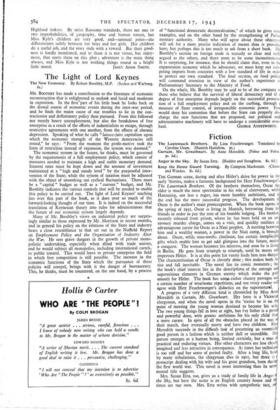The Light of Lord Keynes
MR. BOOTHBY has made a contribution to the literature of economic reconstruction that is enlightened in outlook and lucid and moderate in exposition. In the firse'part of his little book he looks back on the dismal course of economic events during the inter-war period, and he finds the major cause of our troubles to lie in the con- tractionist and deflationary policy then pursued. From this followed not merely heavy unemployment, but also the breakdown of free enterprise as a result of the efforts of industrialists to escape, through restrictive agreements with one another, from the effects of chronic depression. Speaking of what he calls "laissez-faire capitalism upon which the economic strength of the Western democracies still rested," he says : "From the moment the profit-motive took the form of restriction instead of expansion, the system was doomed."
The economic system in the future, he thinks, must be governed by the requirements of a full employment policy, which consist of measures needed to maintain a high and stable monetary demand. Interest rates must be kept down and the amount of investment maintained at a "high and steady level" by the purposeful inter- vention of the State; while the system of taxation must be adjusted with the object of smoothing out cyclical fluctuations. There must be a " capital " budget as well as a " current " budget, and Mr. Boothby indicates the various controls that will be needed to enable this policy to be carried out. The light of Lord Keynes' teaching lies over this part of the book, as it does over so much of the forward-looking thought of our time. It is indeed on the successful translation of Keynesian theory into rules for administrators that the future of our economic system largely depends.
Many of Mr. Boothby's views on industrial policy are surpris- ingly similar to those expressed by Mr. Morrison in recent months, and in general his policy on the relations of the State and industry bears a close resemblance to that set out in the Nuffield Report on Employment Policy and the Organisation of Industry After the War. He sees grave dangers in the growth of private mono- polistic undertaking, especially when allied with trade unions, and he would subject all monopolies, including international cartels, to public control. This would leave to private enterprise the field in which free competition is still possible. The increase in the economic functions of the State which the pursuance of these policies will compel, brings with it the danger of bureaucracy. This, he thinks, must be countered, on the one hand, by a process
of "functional democratic decentralisation," of which he gives soot examples, and on the other hand by the strengthening of Puha mentary authority. Many who will agree about these objective will ask for a more precise indication of means than is provide( here; but perhaps this is too much to ask from a short book. Mt Boothby's section on foreign trade is scarcely so clear and well argued as the others, and there seem to be some inconsistencies It is surprising, for instance, that he should claim that, even in th( expansionist economy which he advocates, we must keep out corn. peting imports from countries with a low standard of life in orde to protect our own standard. The final section, on food policy will command attention in view of the author's experience ao Parliamentary Secretary to the Ministry of Food.
On the whole, Mr. Boothby may be said to be of the company o those who believe that the survival of liberal democracy and of o degree of free enterprise depends largely on the successful prosecu- tion of a full employment policy and on the curbing, through a measure of State control, of irresponsible economic power. Fess would deny his contention that before the State can properly dis- charge the new functions that are proposed, our political and administrative machinery will have to undergo a considerable over-


























 Previous page
Previous page